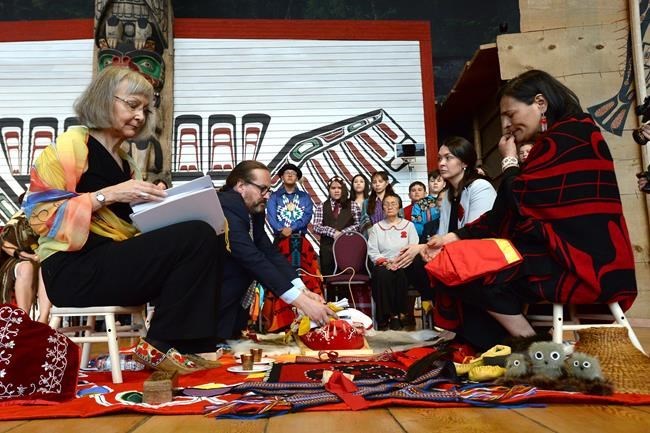The City of New Westminster will champion the establishment of a regional police task force to address the calls to justice in the Reclaiming Power and Place report.
That’s just one of the actions being taken by the city in response to Reclaiming Power and Place: The Final Report of the National Inquiry into Missing and Murdered Indigenous Women and Girls, which was released on June 3 and contains 231 calls to justice. Council unanimously approved a motion by councillors Nadine Nakagawa and Patrick Johnstone that calls on the city, other levels of government and organizations to take action to implement actions in the report.
“Everyone in New Westminster has been called to act. Not just the city. Not just the federal government. Not just the provincial government,” Nakagawa said. “In it, the citizens have been asked, community members have been asked, to develop knowledge and read the final report, to listen to the truths shared, to acknowledge the burden of these human Indigenous rights violations and how they impact Indigenous women and girls, the two-spirit, lesbian, gay, bisexual, transgender, queer, questioning, intersex and asexual people today.”
In the motion, the City of New Westminster affirmed the report’s findings that the actions of governments have constituted genocide.
“Indigenous women and girls are 12 times more likely to be murdered and missing than any other women in Canada and 16 times more likely than Caucasian women. We have to acknowledge their humanity and their value,” Nakagawa said. “This report says that Indigenous women and girls are sacred, as are all people in our community. I think it’s important that we affirm that what they stated, that this is genocide, that we don’t debate that because in doing so debates their value and their humanity.”
The National Inquiry into Missing and Murdered Indigenous Women and Girls’ final report represents the truths of more than 2,380 family members, survivors of violence, experts and others, which were shared over two years of cross-country public hearings and evidence gathering. It includes 231 individual calls for justice directed at governments, institutions, social service providers, industries and all Canadians.
The inquiry found that persistent and deliberate human and Indigenous rights violations and abuses are at the root cause behind Canada’s “staggering” rates of violence against Indigenous women, girls and 2SLGBTQQIA people (two-spirit, lesbian, gay, bisexual, transgender, queer, questioning, intersex and asexual). While there have been thousands of missing and murdered Indigenous women reported in Canada, the inquiry was unable to determine the exact number, as it’s likely that thousands of women’s deaths or disappearances have also gone unrecorded over the decades.
“Despite their different circumstances and backgrounds, all of the missing and murdered are connected by economic, social and political marginalization, racism and misogyny woven into the fabric of Canadian Society,” said chief commissioner Marion Buller in a press release. “The hard truth is that we live in a country whose laws and institutions perpetuate violations of fundamental rights, amounting to a genocide against Indigenous women, girls and 2SLGBTQQIA people.”
New Westminster city council’s motion calls on: the prime minister and New Westminster’s MP to respond to the calls to justice that require action by the federal government; British Columbia’s premier and New Westminster’s MLA to respond to the calls to justice that require action by the provincial government; the New Westminster School Board to respond to the calls to justice that refer to public education; and New Westminster restorative justice committee to provide recommendations to city council and/or the provincial court system to inform a local approach to the calls to justice that refer to the court system.
In addition to incorporating the calls to justice into the City of New Westminster’s ongoing reconciliation work, the city will ask the New Westminster Police Board to respond to the calls to justice. This includes a request that it champion and lead the establishment of a regional police task force to address the calls to justice.
“The recommendations around policing are really on us. It’s something that we can lead, and I think the region has had success in some areas in the past with these integrated task forces that have brought police from around the region together to work on a common problem,” Johnstone said. “This is not something that ends at our border, and I think that one way that our police force can show real leadership on this is to help champion and lead an integrated task force.”
Mayor Jonathan Cote, who chairs the New Westminster Police Board, said he’s very confident the police board and the New Westminster Police Department will be very willing to engage in this difficult, but very important, discussion.
Council members commended Nakagawa for doing the “heavy lifting” and developing some appropriate responses that the city could take in response to the inquiry’s report.
“There’s a relatively concise but really comprehensive executive summary that I think everyone needs to read,” Johnstone said. “It’s a valuable exercise for Canadians to go through, anybody who is interested in how we govern ourselves, how government works and how it often fails to protect people and fails to protect citizens. It’s actually terrifying to read. And it’s hard to read. We owe it to the people who really went through the process of this inquiry to act on it, not to just leave it as a report on a shelf.”
More information about the inquiry and its final report can be found at www.mmiwg-ffada.ca.
“Each of us needs to stand up and become a strong ally,” said a press release from the inquiry’s commissioners. “We must confront and speak out against racism, sexism, ignorance, homophobia and transphobia, wherever and whenever we witness it, and teach or encourage others to do the same, in our workplace, in social settings, and everywhere else. Create time and space for relationships based on respect as human beings, supporting and embracing differences with kindness, love and respect.”



